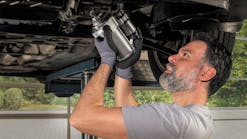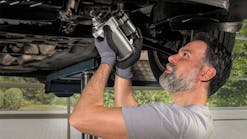Every year about this time, you hear about air conditioning service in the shop. Now that the "new" R-1234yf refrigerant has been circling around the fringe of aftermarket shops for the last couple years, it's certainly making headway into tooling and equipment -- but that doesn't mean you still won't be working on older systems that use R-134a. That's why it's important to be prepared for both.
In this month's Tool Briefing article, contributing writer Barry Hoyland focuses on an inoperative A/C system in a 2010 Dodge Caravan. While this article covers the diagnosis and repair of the vehicle's air conditioning, it's important to note the type of refrigerant used in this Dodge: R-134a. (To read this article, visit VehicleServicePros.com/12057029)
While Hoyland covers a number of tools when servicing this R-134a-equipped vehicle, including an RRR machine and electronic leak detector, did you know that there are different standards for tooling up for the new refrigerant?
During the VISION Hi-Tech Training & Expo this past March in Kansas City, Mo., I had the opportunity to sit in on a course covering changes in HVAC vehicle systems. While this course also delved into extensive parts and component changes for late-model vehicles, the class also covered many tool and equipment updates being made to the market. These include updated SAE standards for equipment used to service R-1234yf refrigerant, as well as products OE and aftermarket shops should consider if they plan on servicing these types of vehicles.
Recently, I also had the opportunity to talk with a number of air conditioning tool and equipment manufacturers on the recent changes in A/C service. To be sure, vehicles using R-1234yf refrigerant will be showing up at your shop soon, if they haven't already. Like many changes in mechanical aspects of a vehicle, it takes the aftermarket a few years to see the trickle-down effect of these changes.
If you do plan on servicing hybrid vehicles, that's another aspect to consider for tools. Did you know that, while traditional belt-driven compressors use PAG oil in the A/C system, high-voltage systems require the use of POE oil? Because POE oil doesn’t attract moisture, it won’t conduct electricity. As a result, there are different RRR machines used to service each (or a hybrid unit that can service vehicles with both types of oil).
If you're seriously considering taking on air conditioning service, or you'd just like a refresher on new tools and equipment on the market, check out my full article, A primer on air conditioning: what to know about changes in refrigerant and tooling. To read online, head to VehicleServicePros.com/12056587.



